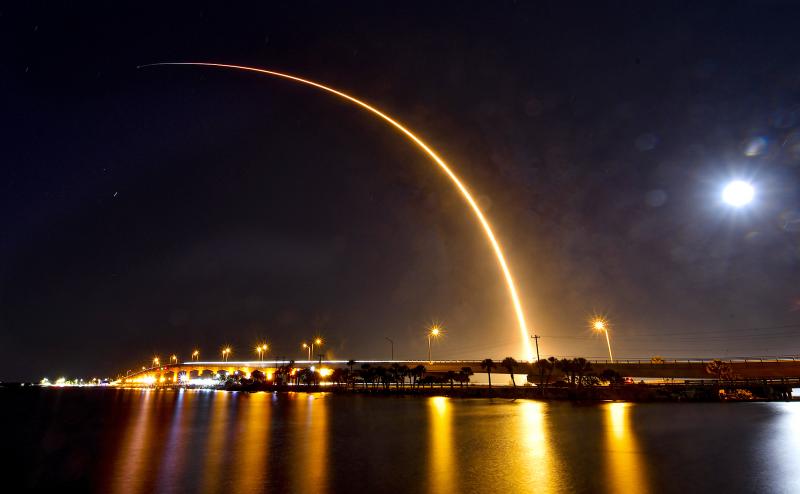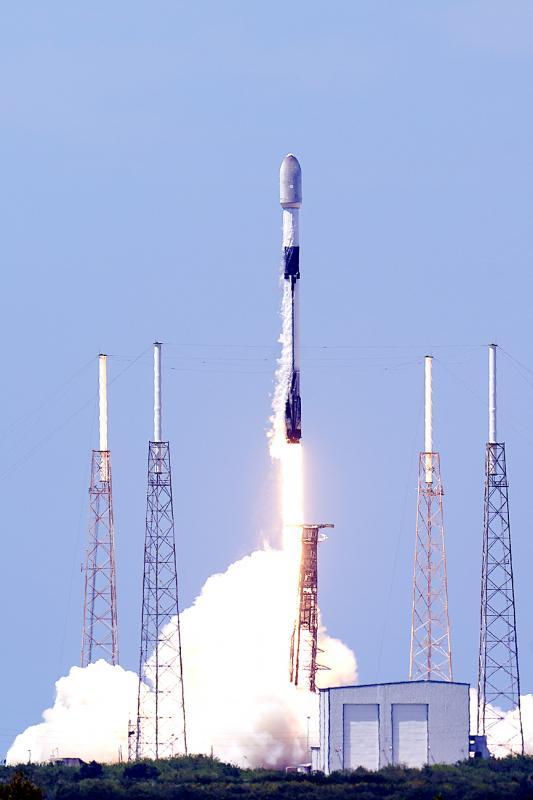Don Joyce, a Nokia Corp manager working from home at a remote lake cottage in Canada, recently abandoned his painfully slow phone-line Internet in favor of satellite broadband service Starlink, offered by Elon Musk’s Space Exploration Technologies Corp (SpaceX).
Starlink, which cost him C$600 (US$487) for hardware and a lofty C$150 monthly subscription, provides “blindingly fast” speeds when uploading videos or streaming movies, he said.
However, the beta test customer said he experiences dropouts during calls on Microsoft Teams and Zoom.

Photo: AP
“If you’re in the city and you have alternatives, I wouldn’t recommend it, but if you’re in the country, like in the middle of nowhere and you’re getting pathetic Internet service, then it’s definitely a competitor,” Joyce said.
For billionaire entrepreneur Elon Musk — CEO of electric vehicle manufacturer Tesla Inc — the success of one of his biggest bets could come down to just how many people like Joyce are out there.
Speaking at the Mobile World Congress event, Musk on Tuesday discussed progress in Starlink technology and subscriber growth as he forecast total investment costs in the satellite Internet business at as much as US$30 billion.

Photo: AP
If the service is successful, it could vastly expand the reach of broadband Internet around the world, connect Tesla vehicles, and even provide a new platform for traders and others with exotic Internet needs, people familiar with the Starlink plan said.
Yet to do that, it must avoid the fate of similar satellite ventures that have preceded it.
“Not bankrupt, that would be a big step,” Musk said last year. “That’s our goal.”
SpaceX’s Starlink division launched its “Better Than Nothing Beta program” in the US in October last year, with data speeds up to a competitive 150 megabits per second.
Early reviews are mixed, with some users complaining of the problems that have always plagued satellite Internet: sensitivity to weather.
Recent heat waves have caused new problems.
“I’m gonna have to spray it with a garden hose to reboot my Internet... That just feels so wrong,” a Reddit user who said he lives in Arizona posted earlier this month, along with an error message saying “Offline: Thermal shutdown” and “Starlink will reconnect after cooling down.”
SpaceX president Gwynne Shotwell in April said that the firm has “a lot of work to do to make the network reliable.”
Service should improve with more satellites and other improvements: Starlink has launched more than 1,700 of its 260kg satellites so far, and envisions more than 40,000.
The economics are daunting nonetheless.
Musk has said that Starlink could serve less than 5 percent of Internet users and still generate US$30 billion a year in revenue.
Critics have said that is wishful thinking.
“Is the demand there for tens of millions of subscribers at that price point?” asked analyst Tim Farrar, president at TMF Associates. “In most parts of the world, if you said to someone, your broadband service will cost you 100 US dollars a month, they’d be like, incredulous.”
He said there might be wealthy people in isolated areas, “but there’s just not very many of those people.”
Starlink would also struggle for enough capacity to support that level of demand, especially as people are consuming more data for video streaming, Farrar said.
That would mean “significant additional expenditure on upgrading the satellites and adding more satellites,” he added.
Pricing pain could be eased by nearly US$900 million in US Federal Communications Commission subsidies earmarked for Starlink for bringing the Internet to rural areas.
SpaceX vice president Jonathan Hofeller said COVID-19 highlighted the need for “access to quality Internet” anywhere on the globe.
Perhaps more importantly, Starlink said it can drive costs down by building its own terminals and satellites.
It has hired engineers from chipmakers Broadcom Inc, Qualcomm Inc and others to design its own communications chips, a person familiar with the matter said — an approach similar to that taken by Tesla.
Starlink has more than halved the terminal cost from US$3,000 and expects it to be in a range of a few hundred dollars within the next year or two, Shotwell said in April.
“Lowering Starlink terminal cost, which may sound rather pedestrian, is actually our most difficult technical challenge,” Musk wrote on Twitter last year.
Starlink also benefits from SpaceX’s low-cost launch capability.
“When you own pieces of the stack, you can do really technically sophisticated things at an affordable cost,” said Misha Leybovich, a former Starlink sales director.
Still, competition promises to be fierce. Amazon.com Inc subsidiary Kuiper Systems LLC has a directly competing project, while OneWeb — a collapsed satellite operator rescued by the British government and India’s Bharti Group — has vowed to be in the game as well.
OneWeb said on Tuesday that it has secured an additional US$500 million investment from Bharti, bringing its total funding to US$2.4 billion.
Meanwhile, terrestrial telecom providers are racing to deploy high-speed 5G broadband services.
The rapid spread of wireless and terrestrial broadband, along with high prices, were significant factors in killing previous low-Earth-orbit satellite ventures. Iridium Communications Inc, which was backed by Motorola Inc, went through bankruptcy after billions of dollars in investment, while a similar fate met Teldesic, backed by Microsoft Corp founder Bill Gates.
SpaceX, Amazon and a number of others have “created quite a race that no one is absolutely sure whether there is a big enough market for it,” Iridium chief executive officer Matthew Desch said.

SEMICONDUCTORS: The firm has already completed one fab, which is to begin mass producing 2-nanomater chips next year, while two others are under construction Taiwan Semiconductor Manufacturing Co (TSMC, 台積電), the world’s largest contract chipmaker, plans to begin construction of its fourth and fifth wafer fabs in Kaohsiung next year, targeting the development of high-end processes. The two facilities — P4 and P5 — are part of TSMC’s production expansion program, which aims to build five fabs in Kaohsiung. TSMC facility division vice president Arthur Chuang (莊子壽) on Thursday said that the five facilities are expected to create 8,000 jobs. To respond to the fast-changing global semiconductor industry and escalating international competition, TSMC said it has to keep growing by expanding its production footprints. The P4 and P5

DOWNFALL: The Singapore-based oil magnate Lim Oon Kuin was accused of hiding US$800 million in losses and leaving 20 banks with substantial liabilities Former tycoon Lim Oon Kuin (林恩強) has been declared bankrupt in Singapore, following the collapse of his oil trading empire. The name of the founder of Hin Leong Trading Pte Ltd (興隆貿易) and his children Lim Huey Ching (林慧清) and Lim Chee Meng (林志朋) were listed as having been issued a bankruptcy order on Dec. 19, the government gazette showed. The younger Lims were directors at the company. Leow Quek Shiong and Seah Roh Lin of BDO Advisory Pte Ltd are the trustees, according to the gazette. At its peak, Hin Leong traded a range of oil products, made lubricants and operated loading

The growing popularity of Chinese sport utility vehicles and pickup trucks has shaken up Mexico’s luxury car market, hitting sales of traditionally dominant brands such as Mercedes-Benz and BMW. Mexicans are increasingly switching from traditionally dominant sedans to Chinese vehicles due to a combination of comfort, technology and price, industry experts say. It is no small feat in a country home to factories of foreign brands such as Audi and BMW, and where until a few years ago imported Chinese cars were stigmatized, as in other parts of the world. The high-end segment of the market registered a sales drop

Citigroup Inc and Bank of America Corp said they are leaving a global climate-banking group, becoming the latest Wall Street lenders to exit the coalition in the past month. In a statement, Citigroup said while it remains committed to achieving net zero emissions, it is exiting the Net-Zero Banking Alliance (NZBA). Bank of America said separately on Tuesday that it is also leaving NZBA, adding that it would continue to work with clients on reducing greenhouse gas emissions. The banks’ departure from NZBA follows Goldman Sachs Group Inc and Wells Fargo & Co. The largest US financial institutions are under increasing pressure